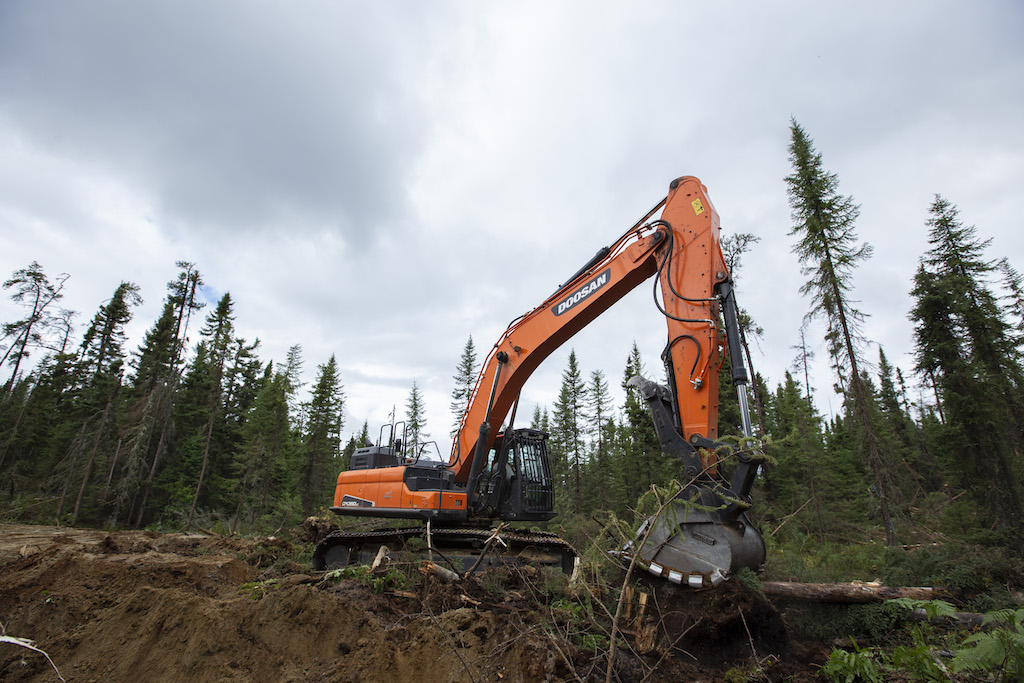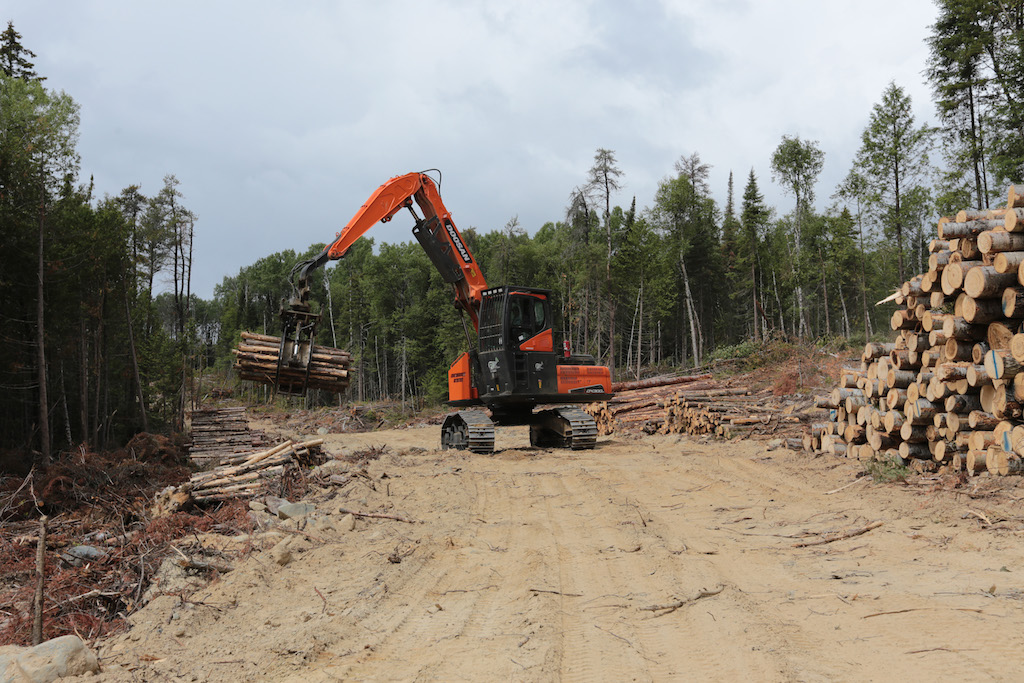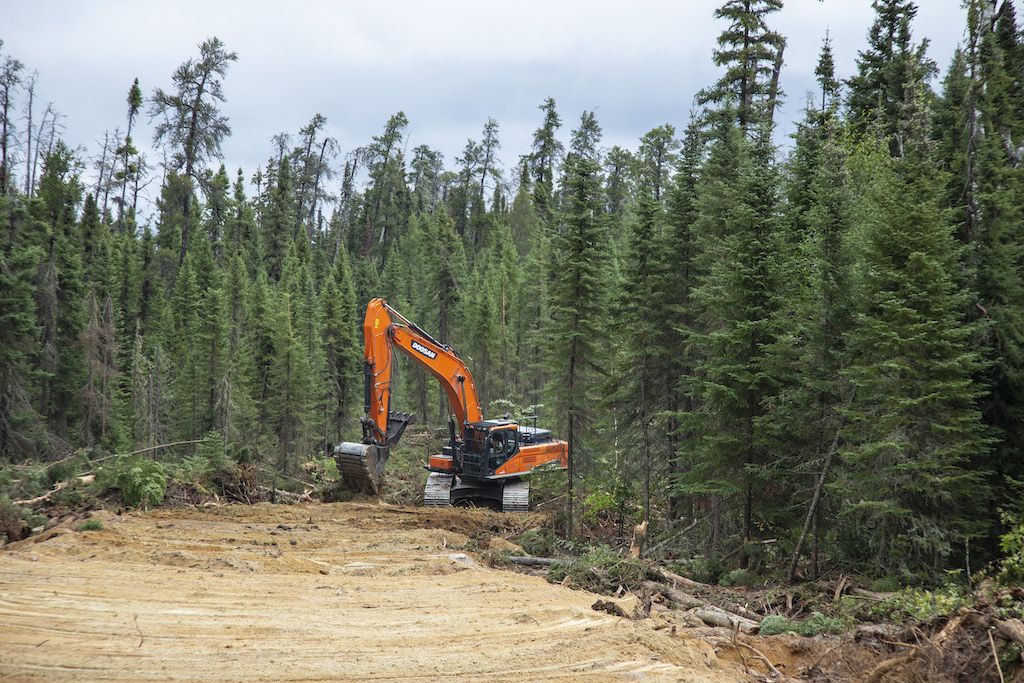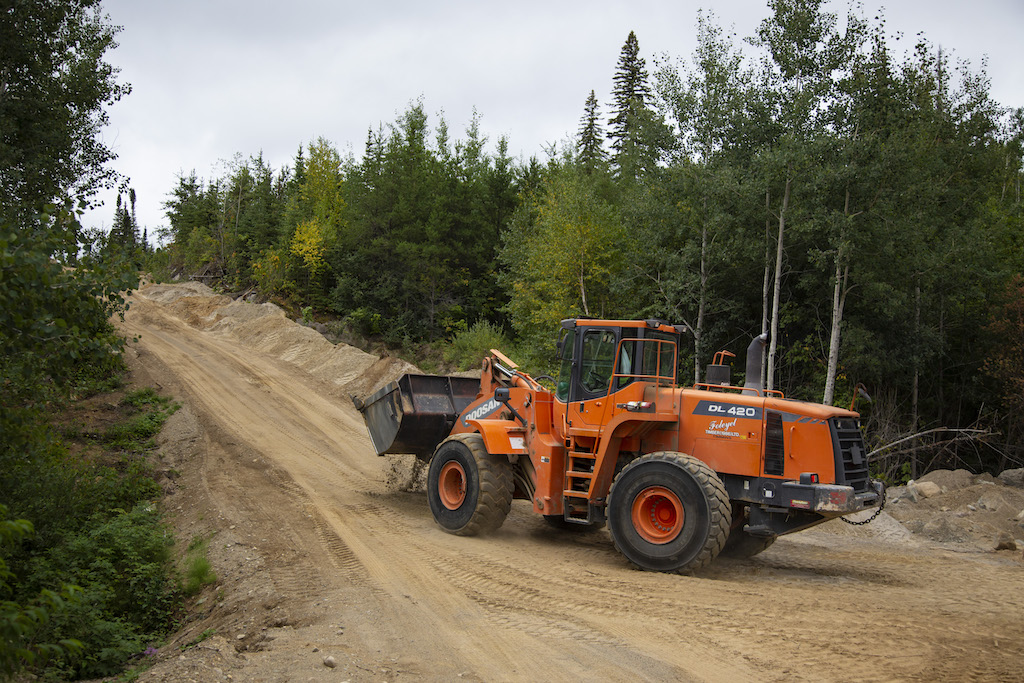
Features
Harvesting
Logging Profiles
Road rules: Inside Foleyet Timber’s roadbuilding and logging operations
October 17, 2019 By Jamie Jackson

When your work window is May to October, efficiency and reliability are essential features of the machines you operate. For Foleyet Timber, based in Timmins, Ont., those machines include a variety of equipment: crawler excavators, articulated dump trucks, a wheel loader and a log loader.
The logging industry has a long, rich history in the province of Ontario. Foleyet Timber has been part of the Canadian logging industry for 56 years, working exclusively for area sawmills, such as EACOM Timmins. Foleyet Timber harvests spruce, pine, balsam, poplar, aspen and birch trees that are processed into dimensional lumber for building decks, garages and homes.
Harvesting timber deep in the northern Ontario forests isn’t an easy task. There’s no infrastructure and there are no cell towers, no power lines and, in most instances, no roads to access the timber stand that Foleyet Timber is tenured to harvest.
Road rules
Before tree felling can begin, Foleyet Timber must build temporary access roads to reach the designated plots of land where they’ve been contracted to clear the timber. Roads are built between May and October when the weather allows, and trees are harvested as the roads allow.
Lance Turgeon, a partner in Foleyet Timber, has been part of the logging business for 33 years. His father-in-law purchased the company from a close friend in 1986, and Turgeon went to work for him. Today, Turgeon has two business partners – Dany Vandal and Michel Mathieu – to help keep the business running smoothly.
Over his 33-plus years, Turgeon has taken on more responsibilities at Foleyet Timber and honed the company’s process down to a science.
“We have a five-year contract, and we break that down by year,” he says.
A forester creates perimeter lines to cut within, and Turgeon and his crew build roads to access the plot. And that’s where the company’s Doosan equipment comes in.
During his three decades in the business, Turgeon has used many equipment brands, but he has relied on Doosan since buying his first Doosan DX300LC crawler excavator in 2012.
“One thing about Doosan machines is they definitely don’t lack power,” he says. “I find them to be stronger than other brands.”
Stump to dump
Turgeon relies on Doosan machines from start to finish, or “stump to dump.” Doosan crawler excavators, including the DX350LC-5 and DX300LC, start the process by subgrading for the access roads.
Once a path is cleared, the DX350LC-5 and DX300LC are used to grade the roadway, which often involves digging up and removing large tree stumps. It’s a step that has been improved by the addition of the Doosan machines.
“My cycle times are quicker because I’m not struggling with moving tree stumps. It makes us more efficient,” Turgeon says.
A Doosan DL420-3 wheel loader is stationed at the company’s gravel pit to load gravel into two Doosan DA30 articulated dump trucks for hauling to the access roads.
“Our forestry equipment weighs more than 40 tons, so the gravel keeps it from sinking in the mud,” he says. “We are known for our road structuring; we are pretty good roadbuilders.”
Foleyet Timber favours gravel rather than asphalt or concrete for better sustainability of the forest land. Gravel allows the access road to return to a natural state so the forest can redevelop in that area.
“We’re a renewable resource,” Turgeon says. “We harvest when the trees are ready. When the area is ready to be planted, we start over for the next generation.”
Once the road is accessible, large forestry cutting equipment – processors and a forwarder – is delivered to harvest the designated timber, typically about 20,000 cubic metres a month.
Once timber felling is complete, another Doosan machine, the DX300LL-5 log loader, is paired with a specialty grapple to pick up the harvested logs that have been placed along the access road and load them on the log trucks to be delivered to the lumber mills for processing.

Comfort keeps operators in the business
Turgeon says the logging industry competes with the mines in the area for quality employees. His industry requires five days away from home per week, compared to an 8-to-5 shift in the mines. So, keeping operators comfortable on the job is essential for Foleyet Timber. The company’s Doosan equipment comes standard with an enclosed cab with heating and air conditioning, which go a long way to keep operators comfortable when working remotely.
Turgeon prefers Doosan machines for their reliability. When the inevitable issue occurs, he knows he can count on the support he receives from his Doosan dealer, ReadyQuip. Turgeon says ReadyQuip goes above and beyond to keep Foleyet Timber productive by creating what he calls “service kits.”
The kits include a list of Foleyet Timber machines, a timeline and description of service intervals for each machine, plus parts, filters or other necessary components. They are packed up and ready for Foleyet Timber to take along when they head out into the forest. The kits help minimize the time and expense of transporting machines several hours for service, and also helps reduce downtime through regular maintenance.
“Downtime is what kills you, and that’s where our dealer comes to the rescue,” Turgeon says. “The service we receive from them is next to none. It sets them apart.”
That includes service that goes above and beyond, even delivering parts to the Foleyet Timber machines that could be hours away from the nearest town, on a road less traveled.

‘Like a family’
Turgeon cares about his employees and takes pride in doing whatever he can to provide for them and their families.
“I am helping our employee’s families,” he says. “They all have children that they want to send to school. As long as I have a job, they have a job. Everyone is as important as the next person. Everyone is the same – we just do different tasks. We’ve been together so long that we’re like a family. If someone has a project at home, we will all go together and do it with him. We are our own community.”
This article was written by Jamie Jackson, strategic communications supervisor, Two Rivers Marketing. It was provided by Doosan Infracore North America, LLC.
Print this page
